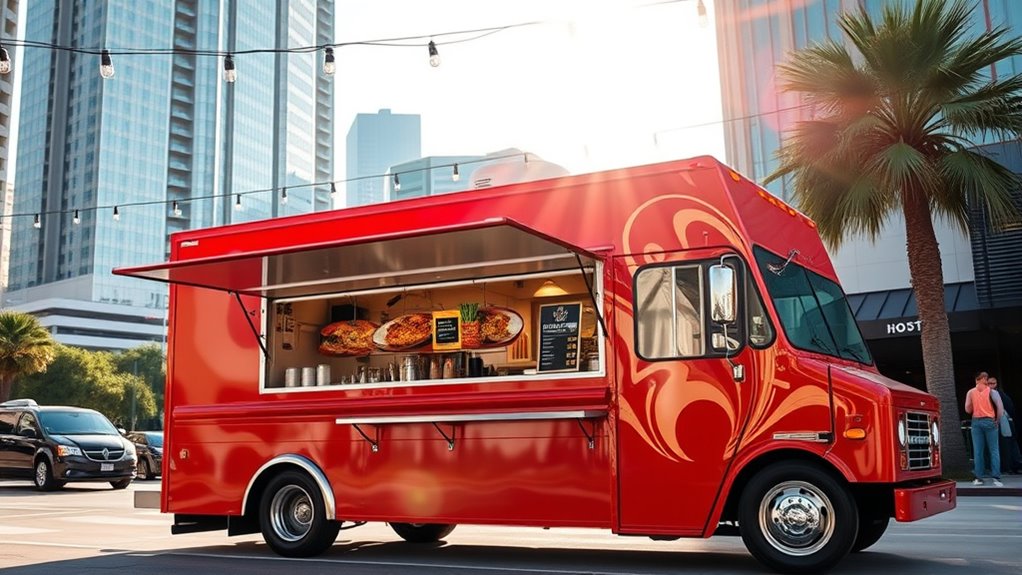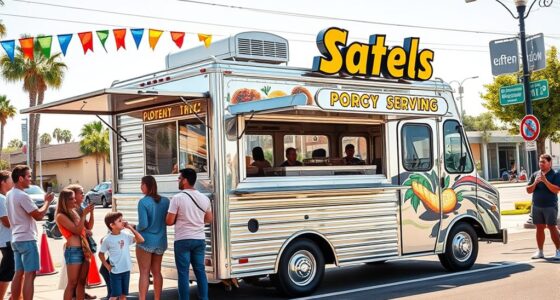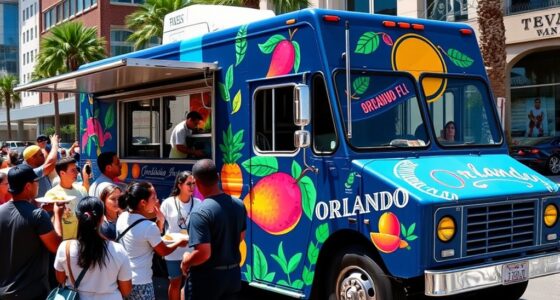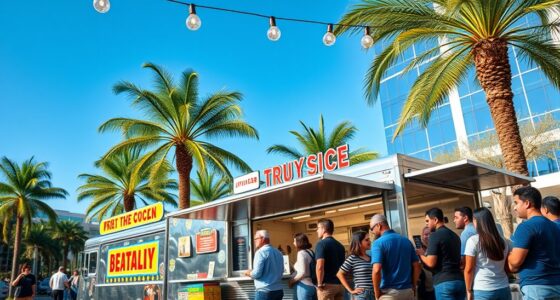Starting a food truck in Houston, TX, is an exciting opportunity with a thriving culinary scene and plenty of local support. You’ll need to understand industry trends, secure the right permits via online portals, and follow sanitation and zoning laws. Budget wisely for vehicle costs, equipment, and marketing. Use technology for efficient operations and engage with the community to build loyalty. Keep exploring to uncover more tips for launching and growing your Houston food truck business.
Key Takeaways
- Obtain necessary permits and licenses through Houston’s online application portals, ensuring compliance with local health and zoning regulations.
- Develop a diverse, trending menu and incorporate innovative offerings to attract customers and stay competitive in Houston’s vibrant food scene.
- Secure funding via microloan programs like SBA Microloan or Houston Small Biz Loan, and budget for vehicle, equipment, and insurance costs.
- Invest in branding, social media marketing, and community engagement to build a loyal customer base and increase visibility locally.
- Implement efficient operations with contactless payments, inventory management software, and strategic participation in local events and festivals.
Food Truck Industry Overview
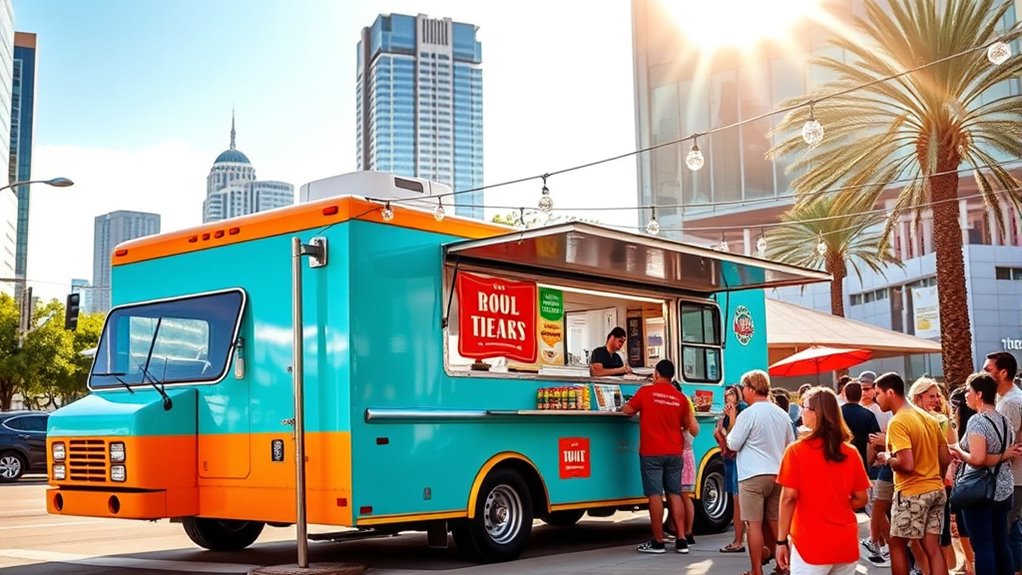
Have you ever wondered why food trucks have become such a popular choice for dining in Houston? The food truck industry thrives by staying ahead of culinary trends, offering innovative and diverse menus that attract a wide customer base. As a food truck owner, you need to prioritize food safety, ensuring all health regulations are met to build trust and reputation. The industry is dynamic, blending creativity with practicality, making it easier to adapt to changing tastes and demands. Success depends on understanding market trends, maintaining high standards for food safety, and delivering fresh, quality food. Incorporating HEPA filtration and other air quality measures can also enhance your food truck environment, providing a safer space for both staff and customers. By focusing on these elements, you can carve out a strong presence in Houston’s vibrant food truck scene and keep your business thriving.
Understanding Local Requirements

To operate a food truck in Houston, you’ll need to navigate online permit application portals and gather all required sanitation documentation. You should also familiarize yourself with local sanitation protocols to guarantee compliance. Additionally, understanding designated food truck zones helps you choose the best spots and avoid penalties. Being aware of local business hours can assist in planning your operations around the most suitable times.
Online Permit Application Portals
Guiding the online permit application portals in Houston is vital for guaranteeing your food truck complies with local regulations. Houston provides dedicated online permit portals that streamline the application process, making it easier for you to submit required documentation. By using these application portals, you can avoid delays and guarantee all necessary forms are accurately completed. It’s important to familiarize yourself with the specific online permit options available, as each type of permit may have its own portal, such as health, fire, or parking permits. Accessing these portals early helps you stay organized and guarantees you meet deadlines. Remember, completing your online permit application correctly is a critical step toward legally operating your food truck in Houston.
Sanitation Protocols and Documentation
Understanding local sanitation requirements is vital to guarantee your food truck operates legally and safely in Houston. You must install and maintain proper handwashing stations readily accessible to staff, ensuring they wash their hands frequently. Developing and following strict sanitizing schedules is essential to prevent contamination. Regularly clean and sanitize all food contact surfaces, utensils, and equipment as mandated by local health codes. Keep detailed documentation of your sanitation practices, including logs of cleaning routines and inspections. These records demonstrate compliance during health department inspections and help maintain high hygiene standards. Staying informed about Houston’s specific regulations ensures you meet all the necessary sanitation protocols, minimizes health risks, and builds customer trust in your food truck operation.
Designated Food Truck Zones
Finding your way through Houston’s regulations for food truck placement is essential to operate legally and avoid fines. Houston has specific food truck zoning laws that designate areas where trucks can park and serve customers. These designated food truck zones are often located near popular spots or events, but you must comply with local parking regulations. Before setting up, verify which zones are approved for food trucks and ensure your vehicle adheres to parking rules, including time limits and distance from other businesses. Some zones may require permits or reservations, so check with city officials or the Houston Health Department. Staying within the approved food truck zoning and following parking regulations helps you avoid violations and builds a good reputation in Houston’s vibrant food scene.
Setting Up Your Base of Operations
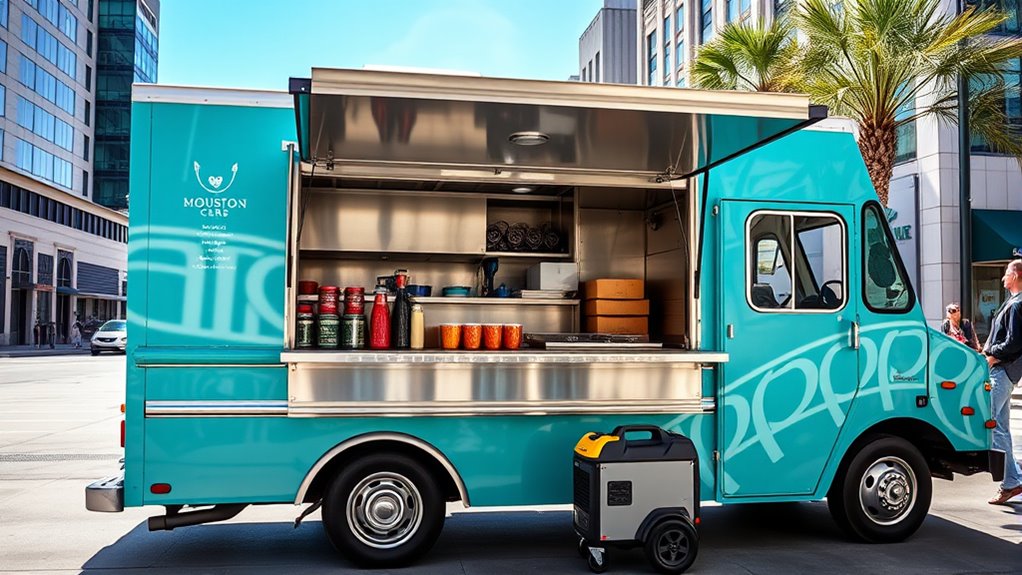
Choosing the right setup for your kitchen is vital, and you should consider shared kitchen licensing options to save costs and stay compliant. Selecting custom kitchen equipment tailored to your menu ensures efficiency and quality. By focusing on these points, you’ll create a strong foundation for your food truck operations in Houston. Additionally, understanding vetted equipment options can help you avoid potential safety issues and ensure durability.
Shared Kitchen Licensing Options
Setting up your food truck’s base of operations often involves selecting a shared kitchen facility, which can be a cost-effective and flexible solution. Shared kitchen licensing allows you to operate legally without building your own commercial space, saving you money and time. These facilities support collaborative cooking, giving you access to professional-grade equipment and proper sanitation standards. When choosing a shared kitchen, verify it’s properly licensed and compliant with local health regulations. This setup enables you to prepare your menu efficiently and meet licensing requirements without the overhead of a dedicated commercial kitchen. Additionally, working in a shared space can provide networking opportunities with other food entrepreneurs, helping you grow your business in Houston.
Custom Kitchen Equipment Selection
Selecting the right kitchen equipment is essential for ensuring your food truck operates efficiently and meets health standards. You need to choose custom kitchen appliances that fit your menu and space, ensuring smooth workflow. Focus on durable, high-quality equipment that can withstand the demands of mobile cooking. Proper equipment maintenance is critical to keep everything running smoothly and extend the lifespan of your appliances.
Keep these points in mind:
- Custom kitchen appliances tailored to your menu
- Compact, space-saving designs
- Easy-to-clean surfaces for hygiene
- Reliable, energy-efficient systems
- Regular equipment maintenance schedule
Budgeting and Financing Your Food Truck
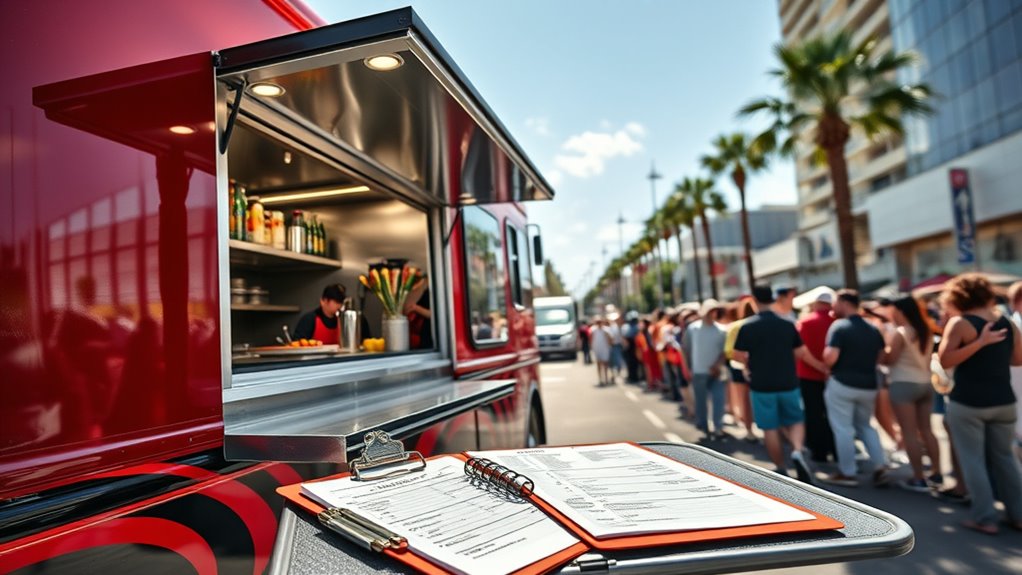
When planning your food truck, you’ll need to contemplate the initial costs of purchasing your vehicle and how to cover those expenses. Affordable microloan programs can help you secure funding without overwhelming debt. Don’t forget to budget for liability coverage to protect your employees and your business. Incorporating economic principles into your financial planning can further optimize your budget management.
Initial Vehicle Purchase Costs
Understanding your initial vehicle purchase costs is crucial for budgeting and securing financing for your food truck. The price of a truck varies depending on size, condition, and customization needs. Consider how fuel efficiency can impact your ongoing expenses; a more fuel-efficient vehicle saves money long-term. Additionally, investing in vehicle branding can boost visibility and attract customers, but it may add to the upfront cost. When evaluating options, keep these factors in mind:
- New vs. used trucks
- Customization and conversions
- Fuel efficiency ratings
- Branding and wrap costs
- Maintenance and warranty coverage
Balancing these costs ensures you choose a vehicle that fits your budget and business goals, setting a strong foundation for your food truck venture.
Affordable Microloan Programs
Affordable microloan programs can be a game-changer when financing your food truck. These microloan programs offer accessible financial assistance, helping you cover startup costs without overwhelming debt. Many programs are designed specifically for small business owners like you, providing flexible repayment options and low interest rates. To make the most of these opportunities, research local and national microloan options tailored for food trucks or small businesses. Here’s a quick overview of some key features:
| Microloan Program | Benefits |
|---|---|
| Houston Small Biz Loan | Low interest, quick approval process |
| SBA Microloan | Larger amounts, proven track record |
| Accion Texas | No collateral needed, flexible terms |
Using these programs can ease your budgeting process and set your food truck up for success.
Liability Coverage for Employees
Securing liability coverage for your employees is an essential step in budgeting and financing your food truck. It protects you from potential costs related to employee safety incidents or accidents. Having proper liability insurance guarantees you’re covered if an employee gets injured while working or on your premises. This coverage helps you manage risks and keeps your business financially stable. Keep these points in mind:
- Prioritize comprehensive liability insurance tailored for food truck operations
- Ensure coverage extends to employee injuries and safety incidents
- Regularly review policies to stay updated on coverage needs
- Invest in training to minimize workplace accidents
- Understand legal requirements for employee safety in Houston, TX
Designing Your Menu and Pricing Strategy
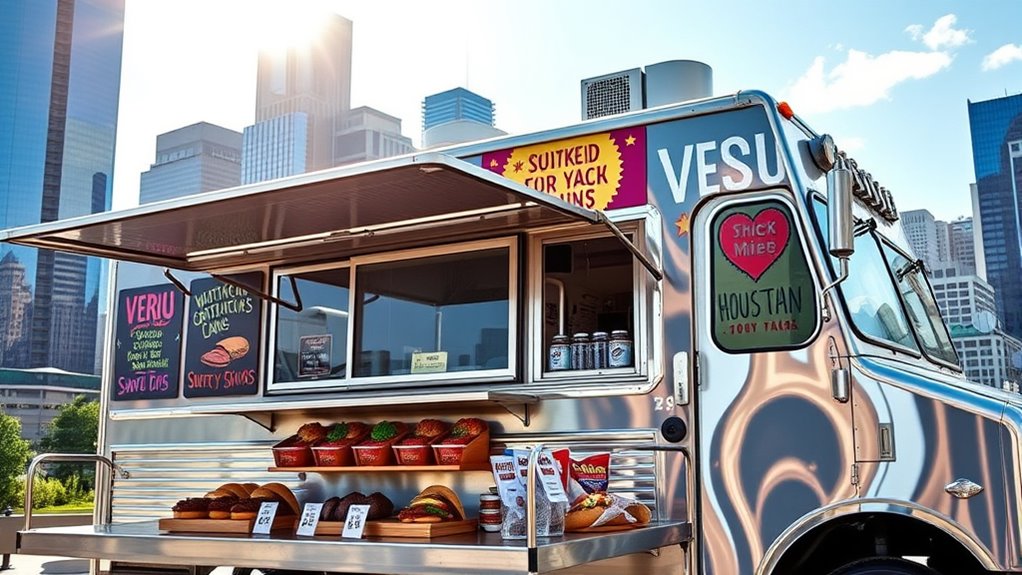
When designing your menu, focus on sourcing ingredients locally to reduce costs and support nearby farmers. Accurate ingredient cost calculations help you set competitive prices that guarantee profitability. By balancing quality with precise pricing, you can attract customers and keep your food truck thriving. Incorporating mindful consumption principles can also lead to less waste and more sustainable operations.
Local Ingredient Sourcing Strategies
Incorporating local ingredients into your menu not only enhances flavor authenticity but also allows you to craft a pricing strategy that appeals to conscious consumers. Focusing on farm-to-table sourcing and seasonal ingredient planning helps you access fresh, high-quality produce while supporting local farmers. These strategies enable you to reduce transportation costs and ensure ingredient freshness, which can justify premium pricing.
- Build relationships with local farmers for reliable supply
- Prioritize seasonal ingredients to maximize flavor and affordability
- Adjust your menu based on local harvest cycles
- Highlight your sourcing story to attract customers
- Negotiate bulk purchases for better pricing and consistency
Precise Ingredient Cost Calculations
To effectively price your menu items, you need to calculate ingredient costs with precision, ensuring your prices cover expenses and generate profit. Accurate ingredient pricing starts with detailed cost analysis—tracking every ingredient’s purchase price, portion size, and usage. This helps you determine the true cost of each dish. Use consistent methods, such as weighing ingredients or measuring portions, to avoid discrepancies. Incorporate overhead costs like labor, utilities, and packaging into your calculations to set realistic prices. Regularly update your cost analysis to account for supplier price changes or seasonal variations. Precise ingredient cost calculations enable you to design a menu that balances affordability with profitability, giving your food truck a competitive edge in Houston’s bustling market.
Technology and Operations

Implementing contactless payment options can speed up transactions and improve customer safety. Real-time stock tracking software helps you stay on top of inventory and reduces waste. These technologies streamline your operations and keep your food truck running smoothly.
Contactless Payment Options Available
Many food trucks in Houston now offer contactless payment options, making transactions faster and more convenient for customers. With contactless payments, you can reduce wait times and improve the overall experience. Plus, customers appreciate the safety and hygiene benefits, especially with mobile ordering options. Implementing these systems can boost sales and streamline your operations. Consider offering multiple contactless payment methods to cater to different customer preferences. Emphasize ease of use and quick transactions to attract more patrons. You’ll also benefit from fewer cash handling issues and faster checkout processes. Incorporating contactless payments can set your food truck apart in Houston’s competitive scene. Make sure your POS system is compatible with popular payment apps and that staff are trained to assist customers seamlessly.
Real-Time Stock Tracking Software
Real-time stock tracking software is essential for keeping your Houston food truck’s inventory accurate and up-to-date. With effective inventory management, you can monitor ingredient levels and prevent shortages or overstocking. This software automatically updates stock counts with each sale, saving you time and reducing errors. It also enhances supplier relations by providing real-time data, allowing you to place timely orders and avoid delays. By integrating stock tracking into your daily operations, you gain better control over your inventory, ensuring you always have what you need for busy days. This technology streamlines your workflow, minimizes waste, and helps you make informed decisions about purchasing. Ultimately, real-time stock tracking software keeps your food truck running smoothly and boosts your efficiency.
Marketing and Growing Your Presence
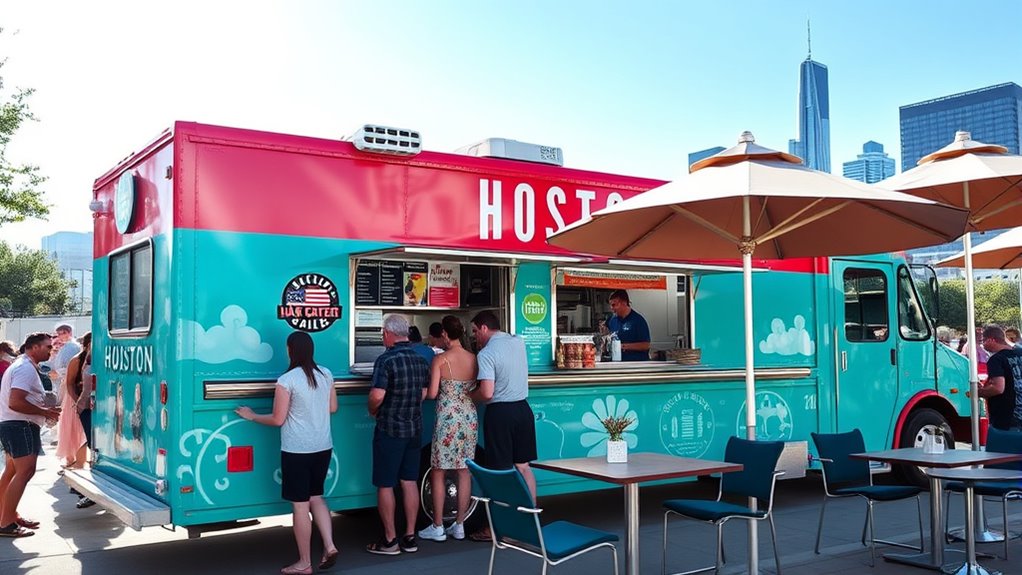
To grow your food truck’s presence in Houston, you should leverage popular event scheduling apps to reach more customers and stay organized. Engaging local food bloggers can also boost your visibility and generate buzz around your offerings. Combining these strategies helps you build a loyal following and attract new patrons consistently.
Popular Event Scheduling Apps
Wondering how to boost your food truck’s visibility and attract more customers? Using popular event scheduling apps can help you plan and promote your appearances more efficiently. These tools streamline your calendar, ensuring you don’t miss key opportunities to engage with the community. When you sync your schedule with social media, you can easily announce upcoming events, building excitement and driving traffic. Consistent updates foster customer loyalty as patrons appreciate your reliability. Here are some tips to maximize their impact:
- Choose apps with social media integration
- Automate event reminders
- Track attendance trends
- Collaborate with event organizers
- Use data to refine your marketing strategy
These apps help you stay organized, boost your presence, and keep your customers coming back.
Engaging Local Food Bloggers
Engaging local food bloggers is a powerful way to expand your food truck’s reach and build a loyal following. Reach out to bloggers who attend local food festivals and invite them to try your menu. Their reviews and posts can generate buzz and attract new customers. Partner with chefs for collaborations, creating buzzworthy events that bloggers will want to cover. Share high-quality photos and behind-the-scenes stories to make your food stand out. Consistently engaging with food bloggers helps you tap into their established audiences, increasing visibility in Houston’s vibrant food scene. Building genuine relationships with local influencers can turn them into advocates for your truck, boosting your reputation and driving steady traffic. This strategy makes your presence felt and helps you grow sustainably.
Houston Food Truck Success Tips
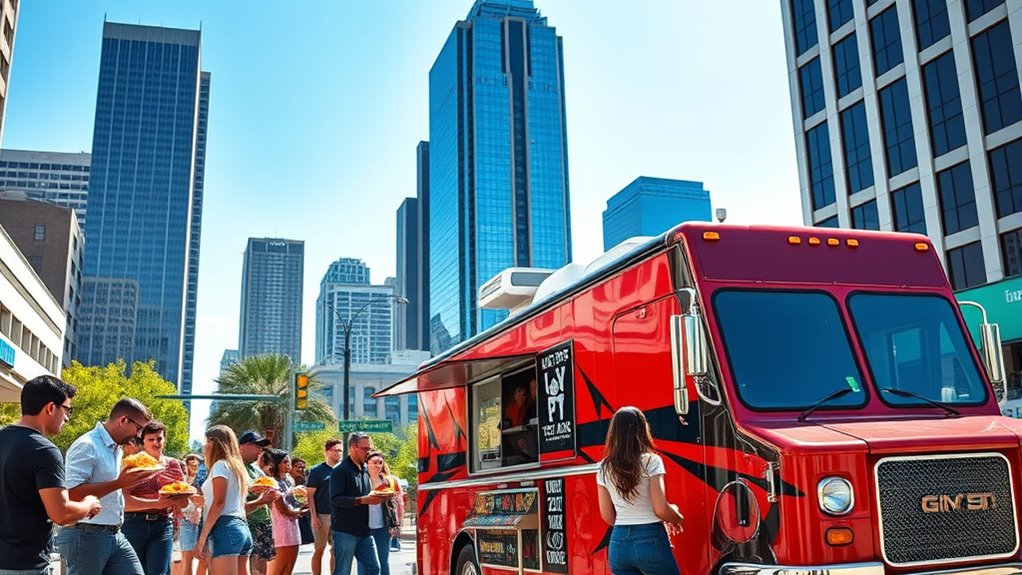
Launching a successful food truck in Houston requires more than just great food; it demands strategic planning and community engagement. To stand out, focus on menu innovation to keep your offerings fresh and exciting, encouraging repeat business. Equally important is customer engagement—building relationships with your patrons fosters loyalty and positive word-of-mouth. Here are some tips to help you succeed:
- Regularly update your menu with new, innovative dishes
- Interact authentically with customers on social media
- Attend local events and festivals for visibility
- Gather feedback to refine your offerings
- Partner with local businesses to expand your reach
Frequently Asked Questions
What Are the Most Popular Food Truck Cuisines in Houston?
You’ll find that tacos, barbecue, and fusion cuisines top Houston’s food truck scene, aligning with current culinary trends and customer preferences. People love authentic Tex-Mex, smoked meats, and innovative dishes that blend flavors from around the world. By focusing on these popular cuisines, you can attract diverse crowds and stay ahead of trends, ensuring your food truck appeals to locals and visitors alike who seek flavorful, trendy, and satisfying bites on the go.
How Do I Find the Best Locations for My Food Truck?
You should analyze foot traffic patterns and parking strategies to find the best locations for your food truck. Visit busy areas during peak hours, like downtown or event venues, and observe where people gather. Use foot traffic analysis tools or apps to identify high-traffic spots. Also, consider parking regulations and nearby competitor locations. Consistently testing different spots will help you discover where your food truck gains the most customers.
What Permits Are Required for Outdoor Events and Festivals?
To participate in outdoor events and festivals, you’ll need event permits and festival licensing from Houston authorities. Check with the city’s special events office to understand specific requirements, which may include health permits, food handler’s licenses, and proof of insurance. Guarantee you apply early, as processing times can vary. Having all necessary permits and licenses assures your food truck complies with local regulations and can safely serve at these lively gatherings.
How Can I Differentiate My Food Truck From Competitors?
You can differentiate your food truck by developing strong branding strategies that highlight your unique identity. Focus on creating eye-catching visuals, memorable logos, and consistent messaging. Offer unique menu items that set you apart from competitors, catering to local tastes or innovative flavors. Engaging social media presence and excellent customer service also boost your visibility. By combining branding strategies with distinctive menu options, you’ll attract loyal customers and stand out on Houston’s vibrant food scene.
What Local Food Safety Regulations Should I Be Aware Of?
You need to stay on top of Houston’s food safety regulations, which are the backbone of your operation. Make sure you undergo proper food safety training to understand health inspection standards and keep your truck compliant. Regularly check local health department updates, as rules can change. Think of it as keeping your house in order—clean, safe, and ready for inspection at any time. This way, you protect your reputation and customers.
Conclusion
Starting a food truck in Houston can be a rewarding venture if you plan carefully and stay adaptable. Remember, Rome wasn’t built in a day, so patience and persistence are key. Focus on understanding local rules, serving great food, and building your brand. With dedication and a clear strategy, you’ll turn your food truck dream into a thriving business on Houston’s lively streets. Keep pushing forward—success often comes to those who keep moving.
